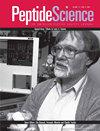调查用于困难或长肽序列自动流动合成的市售树脂
IF 1.5
4区 生物学
Q4 BIOCHEMISTRY & MOLECULAR BIOLOGY
引用次数: 0
摘要
固相肽合成(SPPS)被广泛用于生产肽。自发明以来,固体支持物使合成肽链得以延长。随着技术的发展,SPPS 所能获得的肽链长度已达到单链蛋白质的长度。用于 SPPS 的树脂也在不断进步,以提高合成能力。一系列市售树脂通常采用聚乙二醇 (PEG) 对固体支持物进行功能化处理,以提高合成长序列或困难序列的能力。ChemMatrix® 树脂是广泛使用的聚乙二醇基固体支持物的一个显著例子;不过,这种树脂和几种类似的树脂最近已经停产。在此,我们展示并比较了 OctaGel™、ProTide® 和 TentaGel XV® 树脂在使用自动快流肽合成技术合成从肽到单结构域蛋白质的序列方面的能力。我们的研究表明,每种树脂都能很好地用于自动流式的常规多肽合成,而 TentaGel XV 树脂在合成过程中使用产率、纯度和实时紫外吸光度监测来比较质量时,在合成困难或长肽序列方面表现最佳。本文章由计算机程序翻译,如有差异,请以英文原文为准。

Investigation of commercially available resins for the automated flow synthesis of difficult or long peptide sequences
Solid-phase peptide synthesis (SPPS) is widely used to produce peptides. Since its invention, the solid support has enabled the elongation of the synthetic peptide chain. As technologies have evolved, the length of peptide chains accessible with SPPS has grown to that of single-domain proteins. Resins for SPPS have advanced to improve synthesis capabilities as well. The functionalization of solid supports with polyethylene glycol (PEG) is commonly employed in a range of commercially available resins to aid in the ability to synthesize long or difficult sequences. A notable example of a widely used PEG-based solid support is ChemMatrix® resin; however, this and several similar resins have recently been discontinued. Here, we demonstrate and compare the capabilities of OctaGel™, ProTide®, and TentaGel XV® resins in synthesizing sequences ranging from peptides to single domain proteins using automated fast-flow peptide synthesis. Our studies indicate that each resin performs well for routine peptide synthesis by automated flow, whereas TentaGel XV resin showed the best performance for synthesis of difficult or long peptide sequences when comparing quality using yield, purity, and real-time UV absorbance monitoring during synthesis.
求助全文
通过发布文献求助,成功后即可免费获取论文全文。
去求助
来源期刊

Peptide Science
Biochemistry, Genetics and Molecular Biology-Biophysics
CiteScore
5.20
自引率
4.20%
发文量
36
期刊介绍:
The aim of Peptide Science is to publish significant original research papers and up-to-date reviews covering the entire field of peptide research. Peptide Science provides a forum for papers exploring all aspects of peptide synthesis, materials, structure and bioactivity, including the use of peptides in exploring protein functions and protein-protein interactions. By incorporating both experimental and theoretical studies across the whole spectrum of peptide science, the journal serves the interdisciplinary biochemical, biomaterials, biophysical and biomedical research communities.
Peptide Science is the official journal of the American Peptide Society.
 求助内容:
求助内容: 应助结果提醒方式:
应助结果提醒方式:


